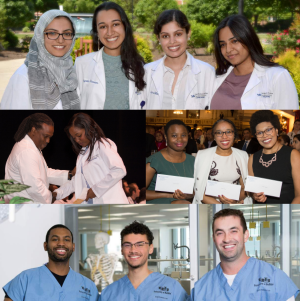Diversity, Equity & Inclusion

In the Department of Medicine, diversity and inclusion are centered around building intentional, meaningful and sustainable bridges across differing backgrounds, communities and schools of thought. We are working to create equity and impactful strides that reverberate not only within the Jacobs School of Medicine and Biomedical Sciences, but also into the depths of medicine on a global level.
We believe that it is imperative to uplift, uphold and celebrate those who are within our own community, with the goal to create a space for the voices, ingenuity and ultimately, the success of our underrepresented faculty. Having notable speakers from top-tier institutions, outreach programs that cross nations, and programs to come, will continue to build opportunity to build a brighter and more inclusive future.
We recognize that an effective, cohesive and productive unit requires a diverse team that, through their landscape of talents and skills, bring unique and critical lenses and experiences to the table. We will strive toward fostering a climate of collaboration and mutual respect, a sense of accomplishment and appreciation, promote knowledge, skills, and best practices, and maintain a safe space where every voice can be heard.
From the desk of the Diversity Advocate, Jessy J. Alexander, PhD:
September is “Women in Medicine” month and we celebrate the women who have contributed to teaching, mentoring, research and patient care. Although women in leadership positions are still scarce, we are proud to mention that two women lead the Jacobs School of Medicine and Biomedical Scienes. The dean of the medical school is Allison Brashear, MD, MBA, and the chair of medicine is Anne B. Curtis, MD.
It all began in late 1847 when Elizabeth Blackwell was accepted by Geneva Medical College in Geneva, NY, into the medical school. After considerable resistance, furor, skillful navigation, grit and determination, she became the first woman to receive a medical degree from a university in the United States. Although exponentially more difficult to obtain a medical degree when they even had restricted voting rights as a black woman, Rebecca Lee Crumpler surmounted what seemed impossible to become the first African-American to graduate from a medical college in the U.S. in 1864. In 1947, Mildred Jackson became the first Black woman to graduate with a medical degree from Harvard Medical School. Antonia Novello became the first female surgeon general of the United States under President George H.W. Bush.
The female physicians of today stand on the shoulders of these giants who blazed a very difficult path in the field, treading where they faced incredible resistance and opposition. We look forward to more trails being blazed, more accolades being won and more equity being established.

Diversity Statement
The Department of Medicine is committed to fostering a diverse and inclusive environment in every aspect of medical education, employment and clinical practice. All individuals have the right to expect mutual respect and acceptance. We believe that diversity enriches us all, and we are committed to providing a welcoming and supportive environment where all individuals are able succeed and thrive.